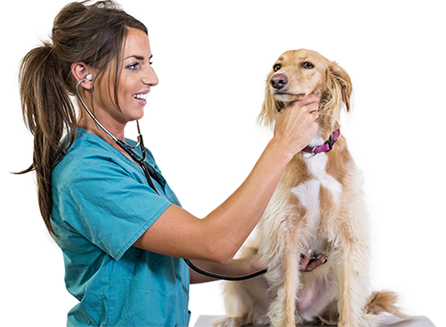
Consultation
Your trip to the veterinarian is almost as educational for you as it is checking out your pet. Besides your many questions and concerns that you may bring with you to the exam room, please br
Your trip to the veterinarian is almost as educational for you as it is checking out your pet. Besides your many questions and concerns that you may bring with you to the exam room, please bring any relevant health information you have, such as records of vaccinations and worming. While answering your questions, your veterinarian will likely do the following:
.
The Australian Veterinary Hospital advises that all animals undergo an annual health check. This is often carried out at the time of the annual vaccination, although even species such as guinea pigs who don’t need vaccinations still need to have check-ups to enable early detection of diseases.
During the annual health check, our vets will examine:
• Eyes for signs of conjunctivitis, tumors, cataracts, and glaucoma.
• Ears for signs of infection, irritation, and tumors.
• Mouth for signs of dental disease such as gingivitis and periodontitis which can result in tooth loss. Many insurance companies require that pets have regular dental check-ups. Rabbits and guinea pigs can also suffer from overgrown teeth.
• Heart for irregularities in the heart beat and murmurs enabling early detection of congestive heart failure and cardiomyopathy, as well as the pulse.
• Lungs, for signs of infection and pulmonary congestion and breathing rate.
• Abdomen is examined for indications of painful areas or tumors.
• Skin and coat are examined for signs of infection, parasites such as fleas, lice, mites, ticks, and tumors. Advice is also given on parasite control using modern effective preparations.
• Limbs are examined for causes of lameness, along with indications of arthritis and tumors. Many effective treatments are now available to alleviate the discomfort of osteoarthritis enabling your pets in living an active, pain-free life.
• Nails are also cut and anal glands evacuated as required.
• Weight of the pet will be measured and their temperature taken.
We also ask our clients to bring a urine sample from their pet. We check this for indications of early kidney problems, diabetes, and other conditions such as Cushing’s Syndrome.
We advise that elderly animals are examined at least twice a year as problems can often develop quickly at this stage of life.
If problems are detected, further investigation will be discussed and any further appointments will be made as required.
We feel that early detection is vital to prevent unnecessary pain and distress. Often early treatment also enables the progression of a disease to be slowed down, ensuring a better quality of life.
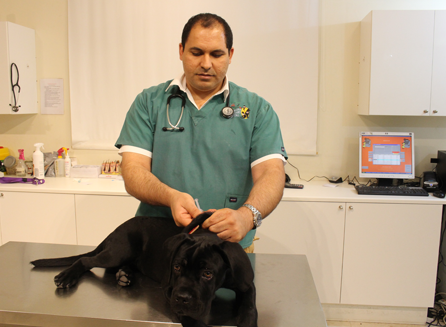
Vaccination
Vaccination is also important in preventing fatal and debilitating diseases.
Puppies are vaccinated against distemper, infectious hepatitis, adenovir
Vaccination is also important in preventing fatal and debilitating diseases.
Puppies are vaccinated against distemper, infectious hepatitis, adenovirus, parvovirus, parainfluenza and leptospirosis.
The first vaccination is given after 6 weeks of age. The second vaccination is given at 10 weeks - or 2 weeks after the first vaccination if the puppy received it after 10 weeks.
Then they receive an annual booster vaccination to maintain a good level of immunity. Dogs going into boarding kennels need an additional vaccination against Kennel Cough.
This can be given ideally at least 10 days before being kenneled but as protection lasts for 1 year, this can also be given annually.
Kittens need to be vaccinated against cat flu (feline herpes virus and feline calicivirus), panleukopenia (also known as feline enteritis) and feline leukemia (a common cause of cancer in cats).
The first vaccination is given at 9 weeks old and the second vaccination is given at 12 weeks old, or 3 weeks later if older than 12 weeks.
Cats also need annual boosters to give them a good level of immunity. They do not need any additional vaccinations before going to kennels.
Dogs and cats need to be vaccinated against rabies. This is given through 1 injection after 12 weeks old. Boosters are given annually.
For pets travelling abroad, a blood test is taken 30 days after the vaccination to ensure there has been an adequate immune response.
Our Clinic offers education on several Parasite Control Programs.
The most common parasites pet deal with are fleas and ticks. Fleas and ticks are capable of transmitting infection and diseases to pets through a single bite. Many pets also suffer from severe allergic reaction to the bites of fleas and ticks. Internal parasites (such as worms) are also capable of causing severe illness in pets. It is imperative that owners use one of the many commercially available products that protect pets from these parasites in order to maintain their pet’s health.
Our staff and veterinarians will help you choose the correct product based on your pet’s risk factors and health status.
In addition, because of the damages posed by intestinal parasites to both pets and people, all dogs and cats should have at least one fecal examination per year to test for intestinal parasites (e.g., roundworms, hookworms, giardia).
We generally recommend to regularly deworm your adult dog and cat once every three months. Please contact us for further details.
Permanent identification:
We recommend that a collar and ID tag be worn by all pets who have any outdoor access. All pets should also be permanently identifiable by placement of a small chip known as a microchip just underneath the skin. This is a very simple procedure performed by injection, and it is over in a matter of seconds! However, the benefits are lifelong. If your pet was ever lost, (nobody means to lose their pets but it happens all too often), this microchip could be used to trace it back to you by any veterinary clinic, rescue society, or shelter with a microchip scanner. Scanning for a microchip is the first thing done when any stray arrives at these facilities without a known owner. Making sure your pet is microchipped is the most effective and permanent means by which you can ensure your pet is identified and will find its way back to you. Many countries require microchip identification for travel; if you plan on traveling now or in the future with your pet, please call us today to make an appointment to discuss the matter.
Health Certificates:
Before an airline can accept your dog for transport or travel, a representative must see a recent health certificate supplied by your veterinarian.
Your veterinarian will need to examine your pet in the consulting room before they can fill out the health certificate. The exam determines whether your pet is in good health and fit to travel or not. Depending on the destination, certain requirements are required to be filled. Please ask your veterinarian.
Check the airline you wish to travel on for the latest rules on how far in advance you can get your health certificate.
Put your health certificate in a safe place — maybe with your airline ticket — so you don't forget to take it to the airport.
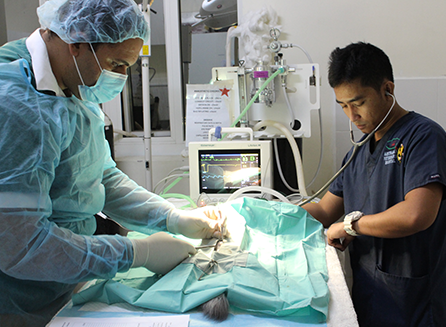
Surgery and Anesthesia
Our state-of-the-art surgical suite offers a wide variety of surgical procedures. The Australian Veterinary Hospital utilizes the safest available anesthetics, along with the most up to dat
Our state-of-the-art surgical suite offers a wide variety of surgical procedures. The Australian Veterinary Hospital utilizes the safest available anesthetics, along with the most up to date anesthetic protocol available, to ensure an extra margin of safety, especially for our older or high-risk patients. Using the most modern equipment, the patient's vital signs are monitored during all anesthetic procedures.
At the AVH we always place an endotracheal tube and oxygenate our patients during our operations using isoflurane, the safest available anesthetic for pets in gas anesthesia. We place intravenous catheters during anesthesia to allow the administration of intravenous fluids and analgesia. We use multimodal monitoring and have special monitors that can watch the blood levels of carbon dioxide and oxygen. We have blood pressure monitors and ECGs too. Anesthesia is tailored to the individual pet's needs, as the pet's age or disease may dictate a special protocol for safety. Spaying and neutering of your pets are performed through orthopedic surgery at the AVH.
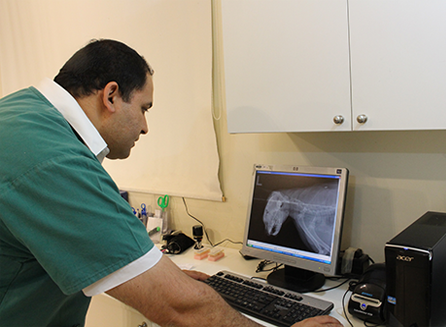
Radiology
Our on-site modern X-ray equipment provides high quality radiographs to aid in the quick diagnosis of many disorders.
We offer complete X-ray capabilities – that in
Our on-site modern X-ray equipment provides high quality radiographs to aid in the quick diagnosis of many disorders.
We offer complete X-ray capabilities – that include special procedures – along with myelograms and barium studies.
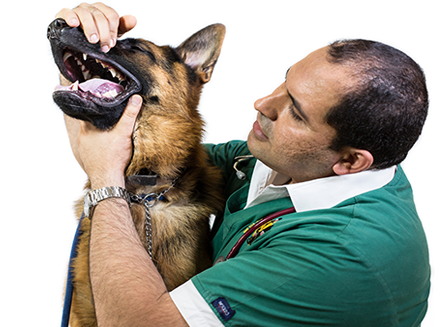
Dentistry
Dental problems are very common in pet animals, and painful abscesses and extractions can often be avoided by preventative descaling with our ultrasound machine. When teeth are in dire need o
Dental problems are very common in pet animals, and painful abscesses and extractions can often be avoided by preventative descaling with our ultrasound machine. When teeth are in dire need of extraction, we offer a range of specific dental surgical instruments and high speed drills. These are very similar to what you find at your own dentist, and we make this process as quick and painless as possible. We also have dental radiography (X-rays), which allows us to look at the roots of the teeth and detect problems such as tooth root abscesses, which may not be visible with oral examination alone. Being able to visualize the roots of the teeth can also prevent unnecessary extractions, as with some cases the roots will have turned to bone and do not need any further treatment.
We perform dental scaling and polishing (prophylaxis) for dogs and cats. To do this we utilize ultrasonic scaling technology, and a high-speed polishing unit. In addition, during the dental procedure, we evaluate the oral cavity for health and offer solutions for diseased teeth and gums (gingivitis).
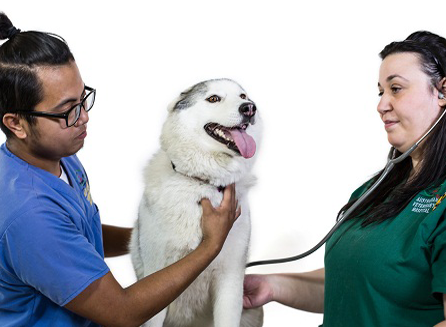
Hospitalization
Continuous care and monitoring is provided for all our inpatients – depending on a patient’s needs and level of intensive care. Our veterinary team are always monitoring and supervising
Continuous care and monitoring is provided for all our inpatients – depending on a patient’s needs and level of intensive care. Our veterinary team are always monitoring and supervising our inpatients – maintaining the best care possible for those hospitalized patients. In our hospital, we utilize a variety of cages and kennel sizes, depending on the patient’s needs. All cages are made from stainless steel, and kenneling allows for optimum cleaning and thus reducing the risks of infection. We separate cat and dog wards, and cages are positioned in such a way that individual patients are never face-to-face, thus avoiding potential confrontation and stress for your pets.
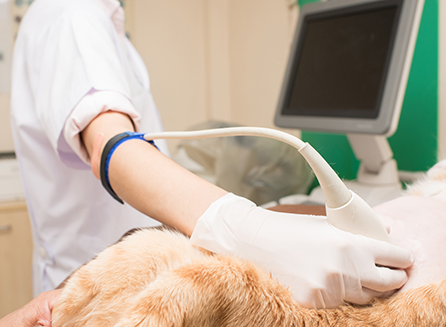
Ultrasound
Ultrasound is the best non-invasive diagnostic procedure that provides far greater diagnostic capabilities on your pet, yielding a lot of information with the least harm or distress. We can see into the abd
Ultrasound is the best non-invasive diagnostic procedure that provides far greater diagnostic capabilities on your pet, yielding a lot of information with the least harm or distress. We can see into the abdomen and examine all soft tissue organs generating a lot of information and clues regarding the status of your pet, with the least amount of risk and pain. Unfortunately, it has a limited scope of use, as for example, we cannot use it to detect bone fractures.
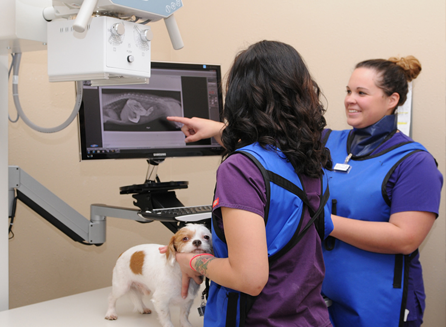
In-house veterinary laboratory
Our in-house veterinary laboratory has a full diagnostic capacity to handle a variety of analyses:
Our patients often mask their symptoms since they c
Our in-house veterinary laboratory has a full diagnostic capacity to handle a variety of analyses:
Our patients often mask their symptoms since they cannot tell us where it hurts, so we use these laboratory analyzers to find early signs of disease or infection. By utilizing the available technology, we can diagnose problems early and begin treatment immediately. Before surgery, we can run bloodwork to test for enzyme levels of the kidneys, liver and other organs, a test which helps us determine your pet’s ability to process the anesthesia. We can also diagnose other diseases such as diabetes, kidney and liver disease, along with thyroid problems.
Our laboratory is very well equipped. We have the necessary in-house resources to help your pet maintain its best physical health. State-of-the-art laboratory analyzers enable us to diagnose diseases and infections in as little as 15 minutes. Results are quick and accurate - often within 15 minutes, allowing our doctors to make a diagnosis on your pet and institute the proper treatment without further delay. We also maintain links with laboratories in the UK and Germany, to allow us to run special tests such as the rabies blood test that is a requirement of import into many countries, such as the UK and Australia.
Our in-house lab gives us the capability to perform a urinalysis and routine blood chemistry, CBC, and electrolyte panel on your pet. For more involved tests, diagnostic samples are shipped the next day to laboratories in the UK, USA, South Africa, and Germany, to allow us to run special tests.
With our in-house pharmacy, we can dispense any necessary pain relievers, antibiotics, or other medication your pet may need.
Early detection of disease or infection is critical for the effective treatment of your pet, and thus can greatly increase your pet’s quality of life and longevity. Our in-house veterinary laboratory features diagnostic testing for the following:
· Stool intestinal worm checks
· Parvo, distemper, ehrlichia
· Blood gases
· Antibiotic sensitivity
· Feline leukemia and feline immunodeficiency virus (FIV) blood tests for cats
· Complete blood counts
· Screening organ function tests - for liver, kidney, pancreas, blood sugar, etc.
· Urinalysis testing
· Cytology of ears, tumors, vaginal smears
· Blood clotting
And much mor
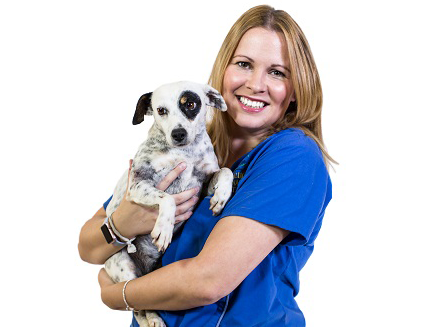
House Calls
House calls offer many conveniences that are sometimes very much needed by our clients. Such a case could be being in faraway places like Al Ain, saving you from traffic jams and long distanc
House calls offer many conveniences that are sometimes very much needed by our clients. Such a case could be being in faraway places like Al Ain, saving you from traffic jams and long distance travelling with your pet. One of the other biggest advantages to your pet is overcoming the fear and trauma that many animals experience when taken from their home to a veterinary hospital. Many animals release pheromones (chemical scent signals), under traumatic conditions that linger in the air and may cause fearful reactions in animals that detect them.
At the Australian Veterinary Hospital, we are committed to becoming your partner in maintaining your pet’s health, and in doing so, enhancing and preserving the unique and valuable bond you share. Our commitment is not only to treat your pets when they are not feeling well, but also to help you learn how to keep your furry family members thriving so you may enjoy the benefits of each other's company for as much quality time as possible.
Pets, especially cats, are territorial creatures of habit. This means that they establish a specifically defined area where they have access to all resources needed for survival, and above all, a safe place to rest. Once this area is established, it is unnatural and rare at best, for a cat to venture beyond these boundaries. When a cat is taken from the safety of its territory, loaded into a car, and driven through city traffic to a place with unfamiliar sounds and smells, this can be an instinctively frightening experience. Suddenly your cat is out of her established area of safety and you, her trusted ally, have directly contributed to that. At this point it is more likely your kitty will hide and will not interact with you after such a stressful event for a couple of days.
At the Australian Veterinary Hospital, we are committed to providing excellence in complete veterinary outpatient care in the serenity of your home. That trip to the vet is no longer always necessary; trusted veterinary care is now at your doorstep.
By examining your pet in its own environment, where it is more secure (and hopefully less aggressive), we can better evaluate behavior and conditions which may be caused or aggravated by vet clinic environment. In addition, there is a lower risk of being exposed to diseases that may be floating around in a hospital waiting room. This is especially important for very young or very old pets that do not have good immunity and, for pets with weakened immune systems.
In addition to the benefits for your pet, a house call may make more sense for many owners. Since you won't have to gather up your pets, drive to the clinic, and wait to see the veterinarian and drive back home, there is less time wasted for you. We offer greater freedom in scheduling appointments and will work around your schedule. Since we will be with you the whole time, you will get more personalized care.
We will provide professional veterinary care to your dogs and cats, specifically geared towards their humane treatment. The focus of our practice is on prevention, since many pets, especially cats when they live in a home or neighborhood with other pets, have a powerful instinct to hide their ailments. This comes from a long history in the wild where life depends on the survival of the fittest. Revealing any weakness or disease is poor survival strategy and avoided if possible. Thorough check-ups and preventive care help detect and address hidden or actively suppressed health problems before they become serious. The earlier a problem is found, the easier it is to overcome and maintain your pet's health for years to come. With every house call, your pet will receive a comprehensive physical exam, vaccinations (if required), and any medicine or pet care product that your pet may need from our fully stocked pharmacy. Dogs and cats can’t tell you when they’re sick. Our veterinarians have a vast clinical experience that helps, but if sometimes we need a closer look into what's ailing your pet, we are outfitted to perform the appropriate diagnostics. The samples for blood panels, fecal exams, urinalysis, biopsies, bacteriological cultures, etc., can be easily obtained in the stress-less environment of your home.
Grooming
A grooming session at Australian Veterinary Hospital leaves your pet looking and feeling great!
Our groomer is trained with years of experience. Professional groomin
A grooming session at Australian Veterinary Hospital leaves your pet looking and feeling great!
Our groomer is trained with years of experience. Professional grooming offers many benefits such as keeping your pet's coat, skin and ears in good condition, increased comfort, social acceptability, and eliminating pet odor. Frequent and regular grooming makes your pet feel better too, and has definite health benefits in cases like allergy and sensitive skin problems. A day with our professional groomer might just be what your precious pooch needs! We provide grooming services for all breeds of dogs and cats. We provide basic bath and brushing that includes bathing with pet formulated shampoo, hair trims, toe nail trims, ear cleaning, and anal gland expression. We also offer a custom design cut to your specifications, including body shaves and lion cuts. We also offer flea baths and tick dips when needed.
If your pet has a medical concern, why not combine the visit and schedule your pet's grooming appointments around its doctor examination?
Grooming services are offered during regular hospital hours. Please call the Australian Veterinary Hospital to schedule a grooming appointment for your pet.
Grooming policies:
Grooming services are available by appointment. Please call ahead to schedule an appointment. Grooming charges are based on the size of your dog, its breed, current coat condition, degree of matting, and specialized grooming needs unique to your pet.
Drop off and pick up times
Grooming pets should be dropped off on the day of their appointment depending on their scheduled grooming time. The groomer will meet with you to discuss any special needs you may have. You should plan to pick up your pet after 3:00 pm, but before the closing time at the end of the day.
Medical and vaccination requirements
For your pet's safety and the safety of our other guests, we require that all grooming pets be up to date on their vaccinations and free from internal and external parasites at the time of grooming. If the Australian Veterinary Hospital has not provided these services, you will need to provide proof that your pet is up to date on the following:
Dogs Requirements:
Rabies
DHLPP
Bordetella (kennel cough)
Free from external parasites or on flea prevention
Cats Requirements:
Rabies
FVRCP
Free from external parasites or on flea prevention
We reserve the right to refuse grooming to any pet that does not meet these requirements.
Payment Policy
Payment in full is due at the time of the pick-up. We encourage you to ask for an estimate of the grooming services so that you are prepared when you arrive for pick up. We accept cash, checks with valid ID or driver's license, and credit cards (Master Card and Visa).
Our Sedation Policy
Most of our grooming cats are sedated to prevent injury to the cat from excessive movement or to calm aggressive cats. However, we will not sedate without your permission. Sedated patients are monitored by the vets.
Kennels & Cattery
At AVH, we provide boarding for both dogs and cats at our very comfortable kennels and cattery conveniently located in both branches in KCA and Reem Island. Rest assured while you’re on hol
At AVH, we provide boarding for both dogs and cats at our very comfortable kennels and cattery conveniently located in both branches in KCA and Reem Island. Rest assured while you’re on holiday, your pets will be treated with the love and care they deserve and taken care of at all times. All you have to do is give us a call to book (make sure to book well in advance before the holidays) and make sure your pet’s vaccinations are all up-to-date. For dogs, please make sure that it’s been less than a year since their last kennel cough vaccination 3 days before boarding.
